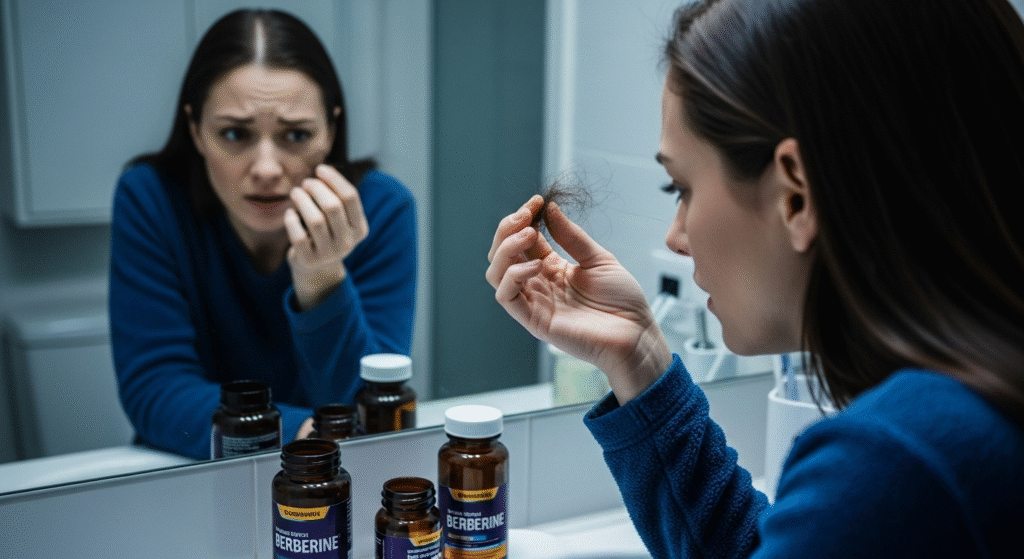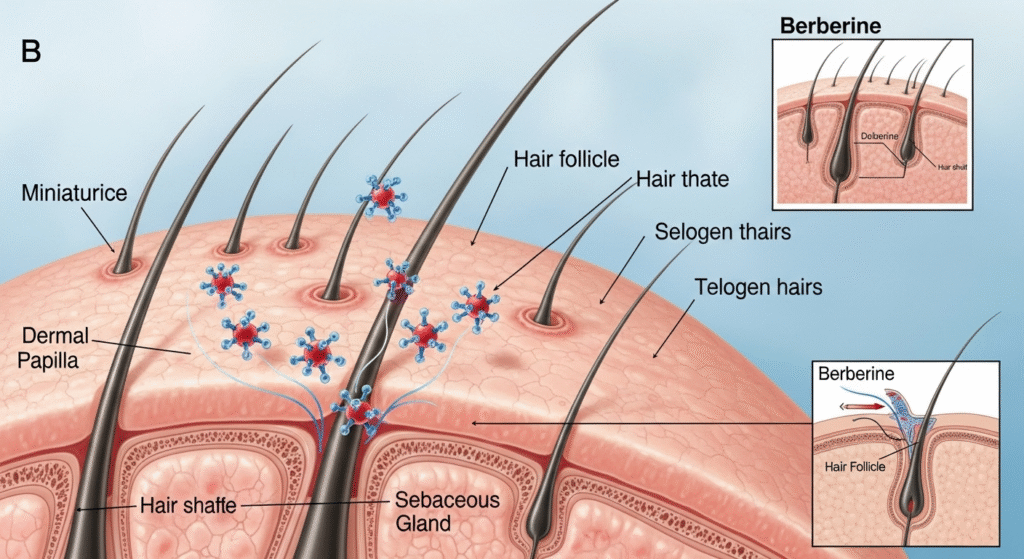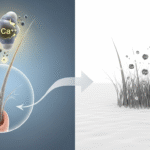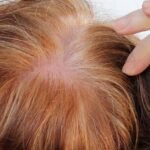Many people use berberine to manage blood sugar levels, improve metabolic health, and support overall wellness. However, some individuals have reported experiencing hair loss while taking berberine. In this article, we’ll explore whether berberine could be a potential cause of hair loss. By the end of this article, you'll have a better understanding of the …
Many people use berberine to manage blood sugar levels, improve metabolic health, and support overall wellness. However, some individuals have reported experiencing hair loss while taking berberine. In this article, we’ll explore whether berberine could be a potential cause of hair loss.
By the end of this article, you’ll have a better understanding of the connection, supported by scientific research and expert insights, to help you make an informed decision about whether to continue using berberine.

What Is Berberine? Can Berberine Cause Hair Loss?
Berberine is a bioactive compound found in several plants, including Berberis species, which are traditionally used in herbal medicine for their anti-inflammatory and anti-diabetic properties. This alkaloid is most commonly used to support metabolic health, particularly in managing blood sugar levels, lowering cholesterol, and improving gut health.
Common Uses and Benefits of Berberine
- Blood sugar regulation: Berberine has been shown to improve insulin sensitivity and lower blood glucose levels, making it a popular supplement for managing type 2 diabetes.
- Cholesterol management: Studies suggest berberine can lower LDL cholesterol and triglyceride levels, reducing the risk of heart disease.
- Gut health support: Berberine has antimicrobial properties and can support healthy digestion by balancing gut bacteria.
Despite these benefits, there are growing concerns about its potential side effects, including its impact on hair health.
Berberine and Hair Health

When considering whether berberine can cause hair loss, it’s essential to understand how it might affect your body’s hormonal balance and overall health.
How Berberine Affects Hormones
Berberine is believed to have an effect on hormones that regulate various bodily functions. Some research suggests it may influence thyroid hormone levels, which play a crucial role in hair growth and overall hair health. An imbalance in thyroid hormones, particularly hypothyroidism, is known to lead to hair thinning or loss.
Potential Mechanisms Leading to Hair Loss
Several mechanisms could explain why berberine may affect hair growth:
- Thyroid disruption: By influencing thyroid hormones, berberine may indirectly impact hair follicles.
- Increased cortisol levels: Some studies suggest that berberine could increase cortisol, the stress hormone, which is linked to hair loss when elevated over prolonged periods.
- Reduced nutrient absorption: Although rare, berberine could affect nutrient absorption in the gut, leading to deficiencies in vitamins and minerals essential for hair health, such as biotin and zinc.
Scientific Studies and Findings
While there are no definitive studies directly linking berberine to hair loss, some scientific studies have indicated that changes in thyroid and cortisol levels may be a contributing factor. For instance, a 2018 study on berberine’s effects on metabolic health found some thyroid-related fluctuations, but no significant data on hair loss were provided.
Anecdotal Evidence and User Experiences

In addition to scientific research, many individuals have shared their personal experiences regarding hair loss while using berberine. While it’s difficult to draw broad conclusions from anecdotal evidence alone, there is a notable number of reports from users who have experienced thinning hair after starting berberine supplementation.
Variability in Responses
It’s essential to remember that each individual’s body responds differently to supplements. While some may experience side effects like hair loss, others may not. Factors such as pre-existing health conditions, diet, genetics, and lifestyle can all influence how berberine affects an individual.
Expert Opinions and Clinical Insights
To gain a deeper understanding of the issue, we turned to medical professionals for their insights.
Insights from Healthcare Professionals
Experts recommend monitoring thyroid function and cortisol levels if you notice unusual hair thinning after starting berberine. In cases of significant hair loss, discontinuing berberine and seeking professional medical advice is advisable.
Considerations for Individuals with Pre-existing Conditions
Individuals with thyroid issues, hormonal imbalances, or other underlying conditions should consult a healthcare provider before starting berberine supplementation. Those with a history of hair thinning may need to be more cautious when introducing new supplements into their routine.
Managing Hair Health While Taking Berberine
If you’re experiencing hair loss while using berberine, there are steps you can take to manage the situation and protect your hair health.
Monitoring Hair Health
Keep track of your hair’s condition and look for early signs of thinning or shedding. If you notice hair loss, consult a healthcare professional who can help determine whether berberine is the cause and suggest appropriate alternatives or adjustments.
Adjusting Dosage or Supplementation
In some cases, reducing the dosage of berberine or switching to a different form of supplementation may help alleviate side effects. Always work with your healthcare provider to adjust the dosage as needed.
Consulting with Healthcare Providers
If you’re concerned about hair loss or other side effects while using berberine, it’s crucial to consult with a healthcare professional. They can provide personalized advice, including thyroid testing, cortisol monitoring, and potential adjustments to your supplement routine.
FAQs
Is hair loss a common side effect of berberine?
Hair loss is not commonly reported, but it can occur in some individuals, especially those with pre-existing thyroid imbalances.
How can I prevent hair loss while taking berberine?
Regularly monitor your thyroid and hormone levels, and adjust your supplement regimen with the guidance of a healthcare professional.
Should I stop taking berberine if I experience hair loss?
Consult your doctor to determine whether berberine is the cause. They may recommend stopping the supplement or making other adjustments.
Conclusion
While berberine offers numerous health benefits, including blood sugar management and cholesterol control, it may cause hair loss in some individuals. The effects are largely dependent on individual health conditions, including thyroid function and hormonal balance. If you’re concerned about hair loss while taking berberine, it’s best to consult with a healthcare provider who can guide you through managing this potential side effect.
If you’re concerned about the effects of berberine on your hair health, Book a consultation with Dr. Uzma Irfan, an ISHRS-certified surgeon in Islamabad today to discuss your options and get personalized advice on managing hair loss and other health concerns. Take control of your well-being with expert guidance!






